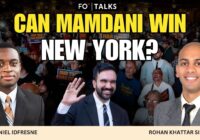Do you need something to worry about? With two hot wars involving nuclear powers, one false move, accidental or deliberate, could at any moment set off World War III. This has been the case ever since late 2021, when then-US President Joe Biden’s administration decided it might be interesting to see what happens if Russia were actually to invade Ukraine. They had decided that Russian President Vladimir Putin’s obsession with engaging diplomacy to redefine Europe’s security architecture was, literally, a “non-starter.”
Biden’s team appeared convinced that diplomacy and the outdated Cold War notion of “indivisible security” are for sissies. After all, nuclear deterrence worked throughout the Cold War, kind of, so why should it be any different today?
Nearly every informed expert — though you would not know this if you consume Western media — has concluded that Russia has won on the battlefield. What’s left is a useless war of attrition which could go on for months or years. Unless, of course, the use by one of the parties of a tactical nuclear weapon, or some other provocation, leads to nuclear escalation. We’ve been living that drama for the past three and a half years. Many Americans voted for US President Donald Trump because he had promised to end that threat within 24 hours.
He’s still working on it. But if that wasn’t enough, nuclear-armed Israel’s permanent campaign to wage war on all its neighbors last week turned into a three-way scuffle when Trump offered to lend a hand by conducting his own massive bombing in Iran alongside Israel. Fears arose that Pakistan might intervene with its nuclear capacity in solidarity with Tehran.
If, in these perilous times, you live in the Middle East, Russia, Ukraine, practically any European capital or the US, you would be justified, every morning when you get out of bed, in thinking there may be something to worry about. Something existential.
But if you’re a multi-billionaire living in the heart of Manhattan, and who also happens to be a pro-Israel Trump supporter, nuclear conflict is the last thing on your mind. There’s much more urgent business to attend to.
American billionaire hedge fund manager Bill Ackman demonstrated that principle in a long tweet posted last week, following the upset victory of Zohran Mamdani over celebrity establishment candidate, Andrew Cuomo, in the Democratic primary of New York City’s mayoral race. His tweet began with this thought: “I awoke this morning gravely concerned about New York City.”
He has good reason to be concerned. Mamdani defined himself as someone ready to respond to the needs of working people and who refuses to kowtow to billionaires. Worse, he publicly empathizes with the evil Palestinians whose genocide in Gaza is being conducted by Ackman’s favorite “democracy” in the Middle East, with the active support of the US government — Trump’s no less than Biden’s. The idea that such a heretic seeking to become mayor of the Big Apple, the home of Wall Street, is far worse a prospect in Ackman’s mind than the risk of nuclear holocaust.
Fortunately, Ackman has a plan to save New York City, which he lays out in his tweet. It contains the following pragmatic advice:
“Importantly, there are hundreds of million of dollars of capital available to back a competitor to Mamdani that can be put together overnight (believe me, I am in the text strings and the WhatsApp groups) so that a great alternative candidate won’t spend any time raising funds.”
Today’s Weekly Devil’s Dictionary definition:
Raising funds:
The primary activity of US politicians, both before and after being elected, and the unique criterion for determining the political talent for those who will have a role in governing the nation, the states or major cities.
Contextual note
It’s no secret for anyone paying attention to serious studies conducted in recent years, that the US, after innovating with the concept of democracy in the late 18th century, has more recently managed to remodel its institutions to assume the character of an effective oligarchy, with strong plutocratic tendencies. Everything we know about how Washington works, the role of lobbyists, the way campaign financing has been structured legally and financially confirms that what we’re looking at is a functional oligarchy that hides itself behind the ritual of lavishly financed elections.
If missing evidence was required, Ackman’s long tweet provides it. Ackman is as generous today with the words that describe his intentions as he will be tomorrow with the cash he promises to make available for the oligarchic cause. Like all true blue Americans, he deeply believes in this one essential truth, that “time is money.” Ackman assures us that “a great alternative candidate won’t spend any time raising funds.” He helpfully reminds us of the mechanism that defines the entire logic of the current system: a politician’s job has little to do with public service or the idea of devoting one’s time to perfecting the tools of governance. It’s about fundraising.
Fundraising is the principal skill every successful politician must acquire and work assiduously at refining. The art of communication, sometimes called spin, stands as the second skill essential to master. This consists of two basic components. The first is learning to speak in ways that sound informed and potentially authoritative (even when totally void of substance). Far more important than the cultivation of verbal style is the crafting of an “image” or public “personality” that projects a sense of commitment to whatever causes are seen from a marketing point of view as characterizing what Ackman calls “a great alternative candidate.”
The hedge fund manager’s unlimited resources will serve to locate and groom the “great candidate” still waiting in the wings to be pressed into service. The beauty of the method consists of relieving the chosen candidate of the task on which ordinary US politicians spend the majority of their working time. According to most estimates, fundraising consumes around 50% of their daily schedule. With fundraising taken care of, the candidate can focus full-time on polishing his or her image for the media.
Historical note
During the first 50 years of the new American republic, the patrician elite known as the “founders” deemed the idea of electoral campaigning unseemly behavior. The Puritan tradition had instilled the notion that community leaders should be elected on the basis of their perceived virtue. The very idea of self-promotion was anathema to the concept of US democracy. Fundraising in the modern sense was non-existent. Politicians counted on newspapers to establish their notoriety. The founding fathers frowned on the idea of parties, which they tended to call “factions.”
During the Jacksonian era, beginning in the 1830s, the expansion of suffrage led to the emergence of a notion of mass politics. Political parties became the major vehicle for promoting individual candidates. Limited fundraising was necessary to support local organizations. But fundraising for the sake of electing a candidate was seen as foreign to the spirit of democracy.
Things changed radically during the Gilded Age towards the end of the 19th century. Corporate interests linked to the rapid development of large scale industry made their pressure felt in politics. The rapid shift from a formerly rural economy to one dominated by massive industries changed the nature of political decision-making. It also transformed the procedures and rituals surrounding elections. Some traditional politicians sensed danger. In 1907, Congress passed the Tillman Act, the first federal law banning corporate donations to federal candidates. In the name of democratic ideals, the political culture of the first half of the new century retained its moral bias against campaign funding.
Post-World War I American culture rapidly turned the traditional system on its head. The emergence of the art of public relations (PR) and the work in the political and electoral field of PR professionals such as Ivy Lee and Edward Bernays, the author of Propaganda (presented as a positive, virtuous concept), transformed political culture.
From that point onward, the mindset of politicians turned from a focus on questions of governance to a far more essential one: getting elected. That meant doing everything required before and after an election to maintain one’s position. That doesn’t exclude politicians’ taking an interest in serious public issues, but it certainly encourages them to stay focused on anything that brings in the cash. That includes backing issues favored by those who donate the most to their campaigns.
The trend accelerated through the age of advertising beginning in around 1950, when Madison Avenue advertising culture began to reign supreme. It culminated with two highly visible events: the Supreme Court ruling in Citizens United (2010) that gave a free rein to corporate funding, followed six years later by the election of Trump, a candidate whose political and personal psyche is nakedly governed by his belief in the power of money. Trump’s political career signals the triumph of the new ideal of self-promotion that has eclipsed the ancient idea of the virtuous citizen.
Although Mamdani has himself developed the requisite skills of self-promotion that enabled him to defeat establishment stalwart, Cuomo, his commitment to causes defined as morally virtuous (combating wealth inequality, refusing complicity in genocide) challenges the status quo — a status quo Bill Ackman and his anonymous billionaire friends are committed to defending, in the name of democracy!
*[In the age of Oscar Wilde and Mark Twain, another American wit, the journalist Ambrose Bierce, produced a series of satirical definitions of commonly used terms, throwing light on their hidden meanings in real discourse. Bierce eventually collected and published them as a book, The Devil’s Dictionary, in 1911. We have shamelessly appropriated his title in the interest of continuing his wholesome pedagogical effort to enlighten generations of readers of the news. Read more of The Fair Observer Devil’s Dictionary.]
[Lee Thompson-Kolar edited this piece.]
The views expressed in this article are the author’s own and do not necessarily reflect Fair Observer’s editorial policy.
Support Fair Observer
We rely on your support for our independence, diversity and quality.
For more than 10 years, Fair Observer has been free, fair and independent. No billionaire owns us, no advertisers control us. We are a reader-supported nonprofit. Unlike many other publications, we keep our content free for readers regardless of where they live or whether they can afford to pay. We have no paywalls and no ads.
In the post-truth era of fake news, echo chambers and filter bubbles, we publish a plurality of perspectives from around the world. Anyone can publish with us, but everyone goes through a rigorous editorial process. So, you get fact-checked, well-reasoned content instead of noise.
We publish 3,000+ voices from 90+ countries. We also conduct education and training programs
on subjects ranging from digital media and journalism to writing and critical thinking. This
doesn’t come cheap. Servers, editors, trainers and web developers cost
money.
Please consider supporting us on a regular basis as a recurring donor or a
sustaining member.
Will you support FO’s journalism?
We rely on your support for our independence, diversity and quality.









Comment